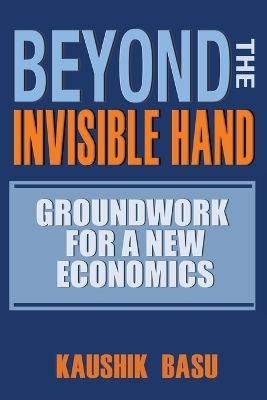
Beyond the Invisible Hand
Princeton University Press (Verlag)
978-0-691-17369-6 (ISBN)
It maintains that, by ignoring the role of culture and custom, traditional economics promotes the view that the current system is the only viable one, thereby serving the interests of those who do well by this system. Beyond the Invisible Hand challenges readers to fundamentally rethink the assumptions underlying modern economic thought and proves that a more equitable society is both possible and sustainable, and hence worth striving for. By scrutinizing Adam Smith's theory, this impassioned critique of contemporary mainstream economics debunks traditional beliefs regarding best economic practices, self-interest, and the social good.
Kaushik Basu is professor of economics and the C. Marks Professor of International Studies at Cornell University. He is currently chief economic advisor to the Ministry of Finance of the Government of India. His books include Prelude to Political Economy: A Study of the Political and Social Foundations of Economics and Of People, of Places: Sketches from an Economist's Notebook.
Preface ix Chapter 1: In Praise of Dissent 1 Discontent and Discourse 1 Smith's Myth 9 The Lay of the Land 11 On Understanding 13 Chapter 2: The Theory of the Invisible Hand 16 Competition and Social Welfare 16 The Standard Critiques 20 Chapter 3: The Limits of Orthodoxy 24 The Dual Interpretation 24 Evolving Feasible Set 27 Evolving Preference 31 Social Norms and Culture 33 A Comment on Incentive Compatibility 41 On Methodological Individualism 43 On Knowledge 49 Chapter 4: The Economy according to Law 55 Kafka's Invisible Hand 55 Law's Economy: The Standard View 57 The Law as Focal Point 60 Implications of the Focal View of Law 66 A Game-Theoretic Illustration of Law as Focal Point 71 A Research Agenda 73 Chapter 5: Markets and Discrimination 77 Do Free Markets Reduce Discrimination? 77 The Literature 79 The Self-Reinforcement of Productivity 83 The Entrepreneur 85 Toward a New Theoretical Model 89 Appendix: Aptitude Test Administered to Slum Children at Anandan in Calcutta 95 Chapter 6: The Chemistry of Groups 97 Identity and Methodological Individualism 97 The Ingredients of Theory 101 Altruism, Trust, and Development 104 The Janus Face of In-group Altruism 110 The Malignancy of Identity 120 Chapter 7: Contract, Coercion, and Intervention 130 Principle of Free Contract 130 Coercion and Voluntariness 138 The Large Numbers Argument 141 Acts and Rules 148 Multiple Equilibria 153 Domains of Intervention 155 Chapter 8: Poverty, Inequality, and Globalization 157 Governance and the Globe 157 Inequality 158 Some Facts of Globalization 161 Some Analytics of Globalization 165 Inequality and Poverty: The Quintile Axiom 167 Poverty-Minimizing Inequality, with or without Globalization 171 Policy Implications 176 Chapter 9: Globalization and the Retreat of Democracy 180 Democracy in Deficit 180 Globalization and Influence 185 Dollarization and Democracy 187 Democratic Global Institutions 189 Chapter 10: What Is to Be Done? 193 Interpreting the World and Changing It 193 The'Environmental Case' against Inequality 199 Despair and Hope 208 Notes 213 References 235 Index 259
| Erscheinungsdatum | 05.08.2016 |
|---|---|
| Zusatzinfo | 8 tables. |
| Verlagsort | New Jersey |
| Sprache | englisch |
| Maße | 156 x 235 mm |
| Gewicht | 454 g |
| Themenwelt | Geschichte ► Teilgebiete der Geschichte ► Wirtschaftsgeschichte |
| Sozialwissenschaften | |
| Wirtschaft ► Allgemeines / Lexika | |
| Wirtschaft ► Volkswirtschaftslehre | |
| ISBN-10 | 0-691-17369-9 / 0691173699 |
| ISBN-13 | 978-0-691-17369-6 / 9780691173696 |
| Zustand | Neuware |
| Haben Sie eine Frage zum Produkt? |
aus dem Bereich


